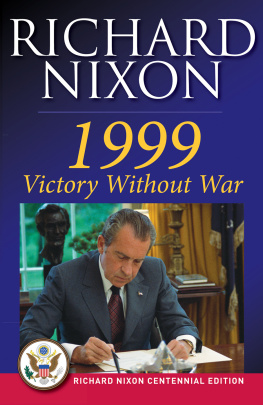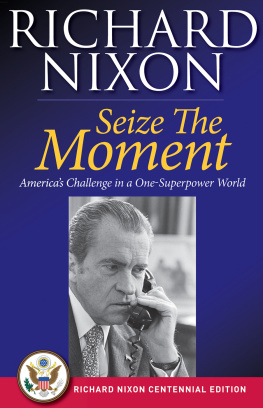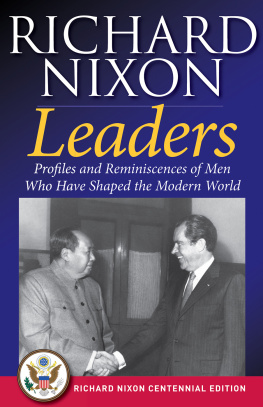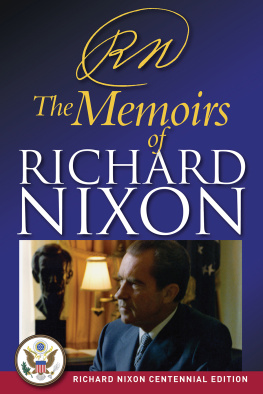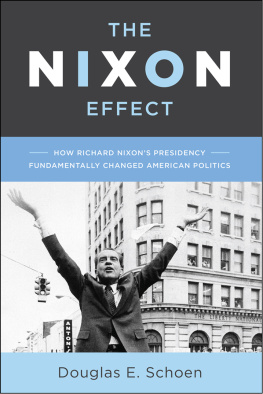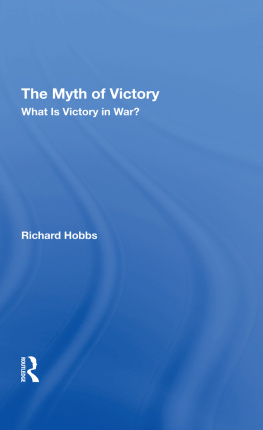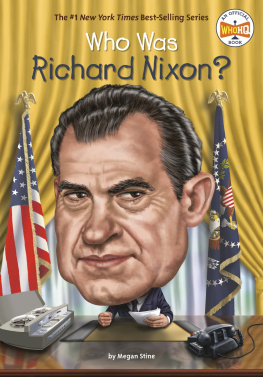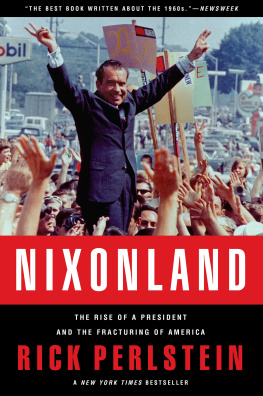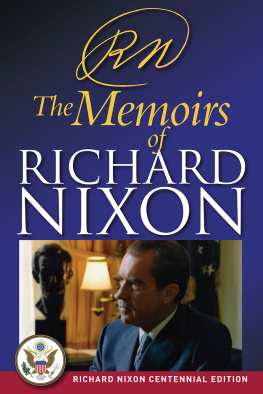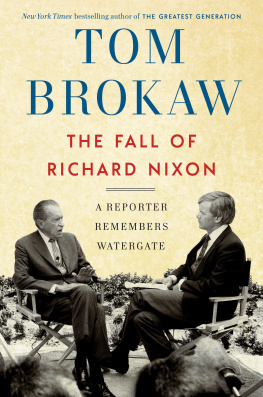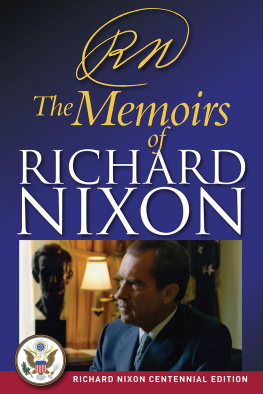Richard Nixon - 1999: Victory Without War
Here you can read online Richard Nixon - 1999: Victory Without War full text of the book (entire story) in english for free. Download pdf and epub, get meaning, cover and reviews about this ebook. year: 1988, publisher: Simon & Schuster, genre: Non-fiction / History. Description of the work, (preface) as well as reviews are available. Best literature library LitArk.com created for fans of good reading and offers a wide selection of genres:
Romance novel
Science fiction
Adventure
Detective
Science
History
Home and family
Prose
Art
Politics
Computer
Non-fiction
Religion
Business
Children
Humor
Choose a favorite category and find really read worthwhile books. Enjoy immersion in the world of imagination, feel the emotions of the characters or learn something new for yourself, make an fascinating discovery.
- Book:1999: Victory Without War
- Author:
- Publisher:Simon & Schuster
- Genre:
- Year:1988
- Rating:3 / 5
- Favourites:Add to favourites
- Your mark:
- 60
- 1
- 2
- 3
- 4
- 5
1999: Victory Without War: summary, description and annotation
We offer to read an annotation, description, summary or preface (depends on what the author of the book "1999: Victory Without War" wrote himself). If you haven't found the necessary information about the book — write in the comments, we will try to find it.
1999: Victory Without War — read online for free the complete book (whole text) full work
Below is the text of the book, divided by pages. System saving the place of the last page read, allows you to conveniently read the book "1999: Victory Without War" online for free, without having to search again every time where you left off. Put a bookmark, and you can go to the page where you finished reading at any time.
Font size:
Interval:
Bookmark:

We hope you enjoyed reading this Simon & Schuster eBook.
Join our mailing list and get updates on new releases, deals, bonus content and other great books from Simon & Schuster.
C LICK H ERE T O S IGN U P
or visit us online to sign up at
eBookNews.SimonandSchuster.com
Thank you for purchasing this Simon & Schuster eBook.
Join our mailing list and get updates on new releases, deals, bonus content and other great books from Simon & Schuster.
C LICK H ERE T O S IGN U P
or visit us online to sign up at
eBookNews.SimonandSchuster.com
Also by Richard Nixon
Beyond Peace
Seize the Moment
In the Arena
No More Vietnams
Real Peace
Leaders
The Real War
RN: The Memoirs of Richard Nixon
Six Crises


F OR
L ON L. F ULLER


I n 1945, a year before his speech in Fulton, Missouri, Winston Churchill wrote to President Truman about the ominous turn events had taken in Europe: An Iron Curtain is being drawn over their front. We do not know what lies behind it. It is vital, therefore, that we reach an understanding with Russia now before we have mortally reduced our armies and before we have withdrawn into our zones of occupation. In failing to heed Churchills advice, the West lost an historic opportunity to negotiate a favorable deal with the Kremlin when our leverage stood at its peak. Today, given the dramatic developments in the Soviet Union, we have another such opportunity.
Since Mikhail Gorbachevs policies of glasnost and perestroika have, understandably, generated so much hope and excitement in the West since the original publication of this book in 1988, it is important to take a hard-headed look at the meaning of his reforms. Many in the West, including some hard-line leaders, have asserted that these changes herald the end of the Cold War. But that conclusion is premature. As long as the geopolitical realities that caused the Cold WarMoscows domination of Eastern Europe and aggressive foreign policies around the worldstill endure, it would be foolhardy for the West to neglect its military deterrent or to abandon its strategy of containment.
Gorbachevs actions are dominated by two principal motivations. First, he recognizes that the Soviet economic system has hopelessly stagnated, that solving this crisis requires reducing the pressures of the EastWest competition and access to Western technology and capital, and that a failure to address these deep-rooted problems would mean that the Soviet Union would disappear as a great power in the twenty-first century. Second, he knows that instead of improving its position in the world, the Kremlins foreign policy has managed to unite all the worlds major powers against the Soviet Union. Since Moscows old thinking led to a dead end, he launched his new thinking to loosen the bonds or break up that anti-Soviet block.
So far, Gorbachevs actions indicated a change not of the heart but of the head. Gorbachevs goal is to reinvigorate his countrys communist system, to make the Soviet Union a superpower not just in military but also in economic and political terms. Without sweeping reforms, he will not be able to afford the costs of the Soviet military establishment and of Soviet client-states, to provide the Soviet People with a better life, to create a model which can be competitive in the global ideological battle, and to keep the Soviet Union in the top rank of world powers. Until the Soviet leadership changes not just the tone of its rhetoric but the character of its foreign policy, it would be a fatal mistake for the West to help Gorbachev in ways that only strengthen the Soviet Unions capability to threaten Western interests.
What the West needs, and what this book attempts to provide, is a strategy for securing real peace in the remaining years of the twentieth century. The economic and political crisis in the Soviet Union has created another historic opportunity for intelligent and skillful Western statesmanship to advance the causes of peace and freedom. To do so, we must present Gorbachev with intractable choices between a less confrontational relationship with the West and the retention of his imperial control over Eastern Europe, between a continuing race in arms technology and arms control that creates a stable strategic and conventional balance, and between access to Western technology and credits and continuing Soviet adventurism in the Third World.
We can sympathize with the thrust behind many of Gorbachevs aspirations. We both want to reduce military competition and the danger of nuclear war. We certainly support those of his reforms that reduce, even marginally, the repression which plagues people living under communism. But our hopes for these reforms still diverge from his in the long run. While Gorbachev wants reforms to create a stronger Soviet Union and an expanding Soviet empire, we want his reforms to create a Soviet Union that is less repressive at home and less aggressive abroad. To achieve real peace in the years before 1999, we need to pursue a determined strategy to bring about the latter and avert the former.

AND THE BEST

I n twelve years we will celebrate a day that comes once in a thousand years: the beginning of a new year, a new century, and a new millennium. For the first time on such a historic day, the choice before mankind will be not just whether we make the future better than the past, but whether we will survive to enjoy the future.
A thousand years ago the civilized world faced the millennium with an almost frantic sense of foreboding. Religious leaders, having consulted Biblical prophecy, had predicted that the end of the world was imminent. In the year 1000, they feared, Gods power would destroy the world. In the year 2000 the danger is that mans power will destroy the worldunless we take decisive action to prevent it.
In 1999, we will remember the twentieth century as the bloodiest and the best in the history of man. One hundred twenty million people have been killed in 130 wars in this centurymore than all those killed in war before 1900. But at the same time more technological and material progress has been made over the last hundred years than ever before. The twentieth century will be remembered as a century of war and wonder. We must make the twenty-first a century of peace.

While the twentieth century was the worst in history in terms of people killed in war, it was the best in terms of progress during peace. Two wars have swept across whole continents, but medical science has swept great diseases off the face of the earth. While more people have died in war in the twentieth century than have died in all wars in previous history, more lives have been spared as a result of agricultural advances which averted famine than died from starvation in all previous history.
Font size:
Interval:
Bookmark:
Similar books «1999: Victory Without War»
Look at similar books to 1999: Victory Without War. We have selected literature similar in name and meaning in the hope of providing readers with more options to find new, interesting, not yet read works.
Discussion, reviews of the book 1999: Victory Without War and just readers' own opinions. Leave your comments, write what you think about the work, its meaning or the main characters. Specify what exactly you liked and what you didn't like, and why you think so.

